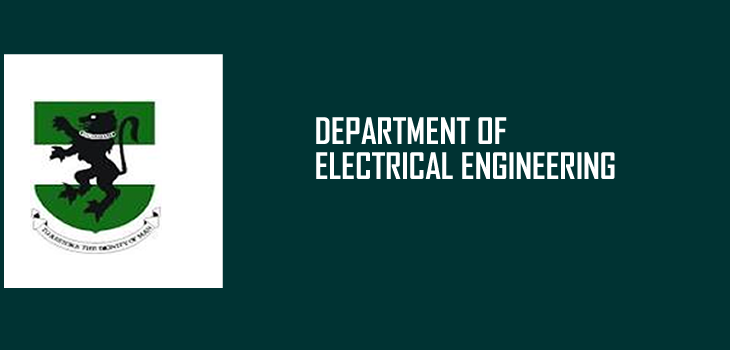BRIEF HISTORY OF THE DEPARTMENT
The teaching of Engineering in the University of Nigeria, Nsukka started in October 1961 by a team of workers form the Netherlands University Foundation. The first group of teaching staff in the Department of Electrical Engineering were recruited in the 1962/1963 academic year and comprised three Lecturers namely: Dr. C. Onianwu, Dr. M. A. Nwachukwu and Mr. Vander Knaap (a Dutch). In the 1965/1966 academic year, the Electrical Engineering Department, under the Faculty of Engineering, graduated its first students who were three in number namely Iwuagwu, Ekpo and Orjiugo.
At the end of the civil war, which disrupted academic activities in the University of Nigeria from July 1967 to January 1970, the University came fully back to life in the 1970/1971 academic year. In the 1975/1976 academic year the Department was renamed the Department of Electrical and Electronics Engineering in recognition of the increasing growth of the Electronics discipline. In 1981, Electrical Engineering and Electronic Engineering became separate Departments, with Electrical Engineering concentrating in the areas of Electromagnetic Field Theory, Electrical Machines, Power Systems, Power Electronics and Automatic Control while Computer Organization, Instrumentation, Communications and Electronic Circuits remained essential supplementary courses. In the 1983/1985 academic year, the Department introduced the postgraduate programme in the four specialist areas of Electrical Machines, Power Systems, Power Electronics and Automatic Control. Improvement in the quality and number of both students and staff has been growing from year to year resulting in steady improvement of the quality of teaching and research in the Department.
PHILOSOPHY
The Department of Electrical Engineering is guided by this University’s basic objective namely:
To seek truth
To teach truth
To preserve truth
In full recognition of the universal criteria for appraising the quality of teaching and research in the Electrical Engineering discipline, the Department will continue to upgrade and strengthen its teaching and research facilities and practices to be of world standard. The Department’s research and teaching activities will, therefore, always be geared towards producing highly skilled, knowledgeable and disciplined human capital and efficient methods/machines for solving real life societal problems.
OBJECTIVES
The five/four year Bachelor of Engineering (B.Eng) programme offered by this Department of Electrical Engineering is designed to produce first degree Electrical Engineering graduates armed with adequate theoretical knowledge and practical experience for successful and fruitful career in the Electrical Engineering profession. At the end of the programme, the students would have been basically equipped to perform the following functions in the course of their individual professional practices:
(a) Design, realize and construct electrical engineering components, equipment and systems.
(b) Develop technical competence in the operation, installation and maintenance of electrical devices.
(c) Conduct further studies and/or research in the development of improved electrical devices and systems in accordance with national and global standards.
(b) Grow through industrial practice in the advancement of electrical engineering knowledge by fostering collaboration with key institutions/academics in developed countries in knowledge transfer in the broad area of electrical engineering.
SCOPE
The program includes both practical and theoretical courses. The students’ Practical Work Experience includes the second year activity of extensive operation and use of the Faculty of Engineering machines and tools (to realize and/or design prototypes) as well as two long vacations and one semester of Industrial Work Experience in the third and forth years of the programme. The workshop practice in the Faculty of Engineering workshops prepares the students for the Industrial Work Experience (in skill acquisition in actual industrial practices).
The first and second years of the programme is also designed to make the students deepen and strengthen their basic knowledge in Mathematics, Physics, Chemistry, Social Science, Electrical Engineering, Mechanical Engineering, Civil Engineering and Computer Programming. The broad based knowledge in the above named disciplines enhances the practice of Electrical Engineering in relation to these other disciplines.
In the third, fourth, and fifth years of the programme, the students are made to spend most of their study time on the major areas of Electrical Engineering while at the same time offering them advanced courses in mathematical, computational and programming methods which constitute a vital and an indispensable tool in efficient and productive engineering practice. These major areas comprise Electrical Machines, Power Systems, Power Electronics, Control Engineering, Electromagnetic Fields – all coupled with well designed supplementary courses in Instrumentation, Computers, Communications, and Electronics. The final year (5th year) study programme also includes a final year project to further deepen the students’ research capabilities and selectable electives to further deepen the students’ knowledge in the above-named specialist areas in Electrical Engineering. For the final year project, each student has to submit a project report and may be orally examined on the report.
The Department of Electrical Engineering in recent past has produced the Best Graduating Students of the Faculty of Engineering in the persons of: Dike Obinna Nnaemeka 2006/2007 Academic Year, Ezeozue Chidubem Donald 2007/2008 Academic Year and Ibeanu Nnamdi Chike 2010/2011 Academic Year.
The Department of Electrical Engineering also offer the following consultancy services to people:
• Rewinding/Maintenance of Electric Motors
• Rewinding/Maintenance of Electric Generators
• Rewinding/Maintenance of Transformers
• Repair of all kinds of Electrical Equipment
• Electrical Installation Design of Buildings
• Measurement/Calibration of Electrical Equipment
• Breakdown Voltage Test of Insulators
• Dielectric Test of Transformer Oil
• Software Designs, Modelling and Computer/ICT training
• Design and Construction of Stand-alone Inverter System for Uninterruptible Power Supply (Battery Backup and Solar Panels Inclusive)


